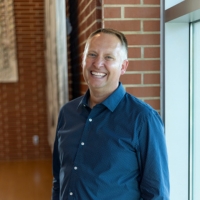A Christian Imagination for AI: Scripture, Screens, and the Shape of Our Souls
.jpg?sfvrsn=7be185f0_1)
I get a lot of questions from teachers and school leaders that sound something like: “Dr. Dave, what should we do with AI? Is this the end of education as we know it?” I absolutely understand why people are asking that question, and I think we need to answer it. But do to so, I believe there is a better question we first need to ask: To address the possibilities and pitfalls of AI, what kind of imagination do we need?
Imagining Scripture
Let’s start with a question that seems simple on the surface: How do you imagine the Bible?
That’s not quite the same as asking what you believe about the Bible. I’m asking what you picture when you think about it. Is it a rulebook? A moral compass? A historical record? A mysterious text from ancient times? Or maybe you see it as a library—a diverse collection of writings, genres, voices, and purposes?
Here’s why that matters: the way we imagine the Bible shapes not just our theology, but also the way we live. When we talk about imagination, we’re not just talking about fairy tales and make-believe. We’re talking about the deep structures of thought that help us interpret the world—what we expect of it, and what we hope for. I would argue that a Christian imagination is one shaped by the Big Story of Scripture: Creation, Fall, Redemption, Restoration.
This is the story that tells us God created the world and called it good. That humans turned away in sin. That Jesus came to restore what was broken. And that God is actively at work, even now, making all things new. It’s not just a story we tell. It’s the story that tells us who we are.
But what happens when other stories start to reshape our imagination?
Humans and Machines
Let’s shift gears for a moment. What do you picture when you think of a computer? A glowing screen? A tower of silicon chips? Or do you catch yourself thinking of it like a brain? Do you ever say a machine is “smart” or that it’s “thinking”? Maybe you’ve even thanked Alexa or apologized to Siri? (You’re not alone.)
Whether we realize it or not, our imaginations have absorbed the metaphors of modern technology. We’ve begun to talk about minds like machines (“I’m processing things”), and we’ve started to treat machines as if they have minds (“It doesn’t want to do what I’m telling it!”).
Alan Turing’s famous thought experiment—the “Turing Test”—was meant to ask: if a computer can imitate a human so convincingly that we can’t tell the difference, does it count as “intelligent”? It’s a clever experiment, but it’s also a mirror, revealing something about us: we’re quick to assign human traits to machines. And sometimes, heartbreakingly, we begin to treat people more like machines—especially in a world mediated by screens, algorithms, and quick-fire responses.
Social scientist Sherry Turkle has been ringing the alarm bell for years.1 Her research shows that we often treat robots like companions and human beings like tools. We expect warmth from our devices and efficiency from our relationships. There’s a kind of flattening that happens—a technological tug on our imaginations that subtly reshapes what we think people are for.
Rewiring the Imagination
This is why the Christian imagination matters so much right now.
Scriptures give us a story that resists flattening. They remind us that human beings are not interchangeable with machines. Christian thinker Andy Crouch uses Jesus’s own teaching on the greatest commandment to describe what it means to be a human being, suggesting that, “Every human person is a heart-soul-mind-strength complex designed for love.”2 Not a processor. Not a user. Not a set of data points. A person—woven together in complexity, whole beings created for relationship.
Technology, for all its gifts, tempts us to dis-integrate that complexity. It offers superpowers—instant knowledge, always-on communication, frictionless convenience—but those powers often isolate one aspect of what it means to be human. We might gain the power of mental efficiency, but at the cost of emotional depth. We might amplify our productivity, but mute our capacity for presence.
There is a difference between someone and something. And we must never forget which is which.
So What Do We Do?
Here’s where our imaginations need some intentional reformation and restoration. If the way we talk shapes what we imagine, and what we imagine shapes what we believe and do, then maybe our words are a good place to start. What if we paid more attention to how we speak about people, Scripture, and technology?
What if we stopped calling machines “smart” and started calling humans “beloved”?
What if we described Scripture less like a manual and more like a love letter—or a rescue story that invites us in?
What if we thought of technology not as a replacement for human interaction, but as a tool that must be wielded carefully, lest it reshape the wielder?
And maybe—just maybe—we should let the Bible not just inform our imagination but actively form it. The kind of formation that helps us see others as image-bearers, helps us say “no” to dehumanizing tech habits, and helps us reorient our hopes around the redeeming work of God.
The Invitation of Imagination
The Bible isn’t just a static text. It’s the living Word that invites us to inhabit a bigger reality. It doesn’t flatten the world—it fills it with depth and beauty and meaning. It reminds us that, while machines may be able to imitate some aspects of us, they can never replace the essence of what makes us human.
I understand the concerns about AI, and I have more to say about that—both the potential for benefits as well as the very real concerns. I want us to imagine both, but let’s be sure our imagination is informed by the Big Story of the Bible and not just by the omnipresent screens in our lives. Let’s be people who know the difference between something and someone. And let’s live like the Big Story is true—because it is.
About the Author


More Blog Posts
-
Dr. Robin Hom | August 5, 2025
-
Francis Ben and Rian R. Djita, Ph.D. | July 29, 2025
-
Dr. Dave Mulder | July 21, 2025
-
Dr. Dave Mulder | July 14, 2025
More ACSI Blog Posts
-
Dr. Robin Hom | August 5, 2025
-
Francis Ben and Rian R. Djita, Ph.D. | July 29, 2025
-
Dr. Dave Mulder | July 21, 2025









edb21062-d750-4541-8bee-11d481a43155.jpg?sfvrsn=ae569917_1)